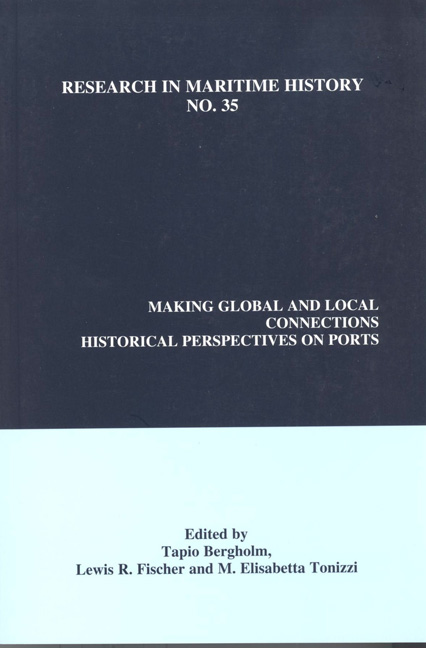Book contents
- Frontmatter
- Contents
- Contributors' Notes
- Contributors
- “Introduction”
- Part I Port Case Studies
- “The International Scope of Bordeaux Port: Logistics, Economic Effects and Business Cycles in the Nineteenth and Twentieth Centuries”
- “The Lancashire Cotton Lobby and the Making of the Manchester Ship Canal from 1883 to the Interwar Period”
- “Mormugao Port: The Golden Gateway to Goa”
- “New Perspectives on Port Competition: Antwerp and Rotterdam, 1945-1975”
- “The Environmental Impact of Ports: An Australian Case Study”
- “A Survey of the Operations of the Port of Kaohsiung, 1949-1957: The Policies for Survival?”
- Part II Port Systems
“The Environmental Impact of Ports: An Australian Case Study”
from Part I - Port Case Studies
- Frontmatter
- Contents
- Contributors' Notes
- Contributors
- “Introduction”
- Part I Port Case Studies
- “The International Scope of Bordeaux Port: Logistics, Economic Effects and Business Cycles in the Nineteenth and Twentieth Centuries”
- “The Lancashire Cotton Lobby and the Making of the Manchester Ship Canal from 1883 to the Interwar Period”
- “Mormugao Port: The Golden Gateway to Goa”
- “New Perspectives on Port Competition: Antwerp and Rotterdam, 1945-1975”
- “The Environmental Impact of Ports: An Australian Case Study”
- “A Survey of the Operations of the Port of Kaohsiung, 1949-1957: The Policies for Survival?”
- Part II Port Systems
Summary
Introduction
It is widely recognised that an efficient transport system which allows the economical movement of goods, resources and people is vital for economic growth and globalisation. During the nineteenth century improvements in transport and communications were major factors in this expansion. In the twentieth century the communications revolution continued with innovations such as the motor car, aeroplane, large bulk carriers, container ships and pipelines for oil and gas. Improvements to road transport and the introduction of railways caused land transport costs to fall by about ninety percent between 1800 and 1910. The real cost of ocean shipping fell by over eighty percent between 1750 and 1990, and by 1980 the real cost of airfreight had declined by about seventy-five percent from its level in the late 1930s. According to the United Nations Conference on Trade and Development (UNCTAD), the increased participation of developing countries in world trade “would not be possible without global shipping networks, port reforms and investments in transport infrastructure as well as trade and transport facilitation.” Moreover, there exists “a virtuous cycle where better transport services lead to more trade, and more trade in turn helps to encourage improved transport services.” By the beginning of the twenty-first century the “tyranny of distance,” while perhaps not completely tamed, was greatly diminished.
In the late twentieth century growing public concern over the environment sparked interest in the long-run impact of humans on the environment and the emergence of the new field of environmental history. A greener generation of historians recognised that “transport systems, although critical to the rise of civilizations, have carried significant environmental costs for global ecosystems for many millennia.” As transport activity has increased, so have its side effects, including air and noise pollution, CO2 emissions and congestion. The expansion of transport infrastructures like ports, roads, railways and airports can potentially cause serious environmental damage.
Australia's large area and limited population has meant that transport has been vital in overcoming the “tyranny of distance.” The cost of ocean transport is especially significant as it affects the competitiveness of the country's exports and effectively provides a tariff wall for manufacturing. Because Australia in an island nation its ports are vital gateways and interfaces in the transport network.
- Type
- Chapter
- Information
- Making Global and Local ConnectionsHistorical Perspectives on Ports, pp. 85 - 106Publisher: Liverpool University PressPrint publication year: 2007

